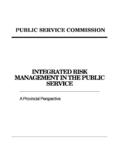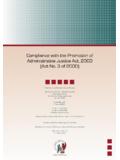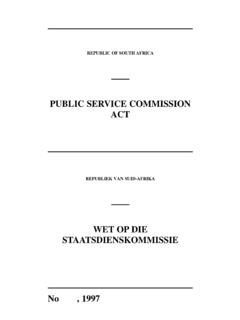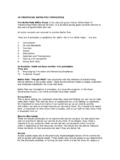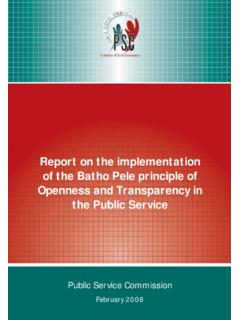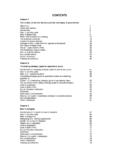Transcription of Report on the Assessment of the Effectiveness of …
1 Public Service Commission June 2012 Report on the Assessment of the Effectiveness of the batho pele Policy in Public Service DeliveryVisionA champion of public administration excellence in democratic governance in South Africa. MissionTo promote the Constitutionally enshrined democratic principles and values of the Public Service by investigation, research, monitoring, evaluating, communicating and reporting on public in the Republic of South Africa by:THE PUBLIC SERVICE COMMISSIONC ommission HouseCnr. Hamilton & Ziervogel StreetsArcadia, 0083 Private Bag x121 Pretoria, 0001 Tel: (012) 352-1000 Fax: (012) 325-8382 Website: Anti-Corruption Hotline Number for the Public Service:0800 701 701 (Toll-Free)Compiled by Branch: Monitoring and EvaluationDistributed by Directorate: Communication and Information Services Printed by: Black XISBN: 978-0-621-41334-2RP.
2 320/2012 Report on the Assessment of the Effectiveness of the batho pele Policy in Public Service DeliveryForewordSince 2000, the Public Service Commission (PSC) has, within its Constitutional mandate of monitoring and investigating adherence to applicable procedures in the Public Service, conducted studies to assess the level of compliance with the implementation of the batho pele policy by departments. This has culminated in a series of evaluations on the implementation of each of the batho pele principles in the Public Service. However, these studies have largely focused on the extent of compliance with the batho pele policy. As part of taking its oversight further in this area, the PSC has, therefore, decided to conduct a study focusing on the Effectiveness of the batho pele policy in improving public service delivery.
3 This study thus goes beyond compliance issues, and examines the difference made by departments in their implementation of the batho pele trust that this Report will once again draw the attention of the Public Service to the importance of the batho pele principles in service delivery. The recommendations contained in this Report , if implemented, could contribute to the Effectiveness of the batho pele in ensuring that citizens receive the services they were promised and are empowered to meaningfully take part in the decisions on public service delivery. It is hoped that the Report will further contribute to the internalisation of the batho pele principles in all departments service delivery B MTHEMBUCHAIRPERSON: PUBLIC SERVICE COMMISSIONii1 Republic of South Africa.
4 Department of Public Service and Administration. The White Paper on Transforming Public Service Delivery. democratic government of South Africa has based its Public Service transformation programmes on a service user-centred service delivery approach. In line with this approach, government adopted the White Paper on Transforming Public Service Delivery (WPTPSD) in 1997. Commonly known as the batho pele policy, the White Paper requires departments to ensure that citizens needs become the main focus of public service delivery and that all citizens have equal access to public services of the same high quality1. Therefore, the effective implementation of the batho pele framework is an important indicator of progress made in building such a service user-centred Public of Contents FOREWORD LIST OF TABLES LIST OF FIGURES ACRONYMSEXECUTIVE SUMMARYCHAPTER 1: Background to the Mandate of the Public Service Aim and Objectives of Structure of ReportCHAPTER 2.
5 AN OVERVIEW OF THE PREVIOUS STUDIES CONDUCTED ON THE batho pele Introduction Report on the Survey of Compliance with the batho pele Policy, 2000 Report on the Evaluation of batho pele Principle of Service Standards in the Public Service, 2005 Report on the Evaluation of Performance and Compliance with the batho pele Principle of Redress, Report on the Evaluation of Performance and Compliance with the batho pele Principle of Access, Report on the Evaluation of Performance and Compliance with the batho pele Principle of Value for Money in the Public Service, Report on the Evaluation of Performance and Compliance with the batho pele Principle of Consultation, 2007 Report on the Implementation of the batho pele Principle of openness and Transparency in the public Service, Report on the Evaluation of the Implementation of the batho pele Principle of Information, Report on the Evaluation of the Implementation of the batho pele Principle of Courtesy, 2009 iiviviviiix12344566889910101011 CHAPTER 3: Introduction Methodology Data Analysis Limitations of the StudyCHAPTER 4: OVERVIEW OF KEY FINDINGS OF THE Introduction Key FindingsCHAPTER 5: KEY FINDINGS: EASTEN CAPE Introduction Interviews Conducted and Service Delivery Points visited during Data Key Findings CHAPTER 6: KEY FINDINGS.
6 FREE STATE Introduction Interviews Conducted and Service Delivery Points visited during Data Collection Key Findings CHAPTER 7: KEY FINDINGS: GAUTENG Introduction Interviews conducted and Service Delivery Points visited during Data Key Findings CHAPTER 8: KEY FINDINGS: KWAZULU-NATAL Introduction Interviews Conducted and Service Delivery Points visited during Data Key Findings iv12131315151617172930303038393939484949 4955565656vCHAPTER 9: KEY FINDINGS: LIMPOPO Introduction Interviews Conducted and Service Delivery Points visited during Data Collection Key Findings CHAPTER 10: KEY FINDINGS: MPUMALANGA Introduction Overview of the Mpumalanga Department of Health and Social Development Interviews Conducted and Service Delivery Points visited during Data Key FindingsCHAPTER 11: KEY FINDINGS: NORTHERN CAPE Introduction Interviews Conducted and Service Delivery Points visited during Data Key FindingsCHAPTER 12: KEY FINDINGS: NORTH WEST PROVINCE Introduction Interviews Conducted and Service Points visited during Data Key FindingsCHAPTER 13: KEY FINDINGS: WESTERN CAPE Introduction Interviews Conducted and Service Delivery Points visited during Data Key FindingsCHAPTER 14: KEY FINDINGS.
7 NATIONAL Introduction Interviews Conducted and Service Delivery Points visited during Data Key Findings66676767757676767785868686989999 9910 9110110110120121121124 CHAPTER 15: CONCLUSION AND Introduction Conclusion RecommendationsANNEXURE AANNEXURE BLIST OF TABLEST able 1: List of the national and provincial Departments that were selected to participate in the studyTable 2: Eastern Cape service delivery points of the DoH and DoSD visitedTable 3: Free State service delivery points of the DoH and DoSD visitedTable 4: Gauteng service delivery points of the DHSD visitedTable 5: KwaZulu-Natal service delivery points of the DoH and DoSD visitedTable 6: Limpopo service delivery points of the DHSD visitedTable 7: Mpumalanga service delivery points of the DHSD visitedTable 8: Northern Cape service delivery points of the DoH and DoSD visitedTable 9: North West service delivery points of the DoH and DoSD visitedTable 10: Western Cape service delivery points of the DoH and DoSD visitedTable 11: DoP and DHA service delivery points visitedTable 12: Examples of performance indicators to be used by Departments to compile data on the implementation of the batho pele principlesLIST OF FIGURESF igure 1: Implementation of the PSC s recommendations by the Eastern Cape DoH and DoSD under each batho pele principleFigure 2: Implementation of the PSC s recommendations by the Free State DoH and DoSD under each batho pele principleFigure 3.
8 Implementation of PSC s recommendations by the Gauteng DHSD under each batho pele principleFigure 4: Implementation of the PSC s recommendations by the KwaZulu-Natal DoH and DoSD each batho pele principleFigure 5: Implementation of the PSC s recommendations by the Limpopo DHSD under each batho pele principleFigure 6: Implementation of the PSC s recommendations by the Mpumalanga DHSD under each batho pele principleFigure 7: Implementation of the PSC recommendations by the Northern Cape DoH and DoSD under each batho pele principlevi14114214214314 615 0133039495667768699110121144374654647382 95viiFigure 8: Implementation of the PSC s recommendations by the North West DoH and DoSD under each batho pele principleFigure 9: Implementation of the PSC s recommendations by the Western Cape DoH and DoSD under each batho pele principleFigure 10.
9 Implementation of the PSC s recommendations by the DoP, DPSA and DHA107118135 AcronymsAG Auditor-GeneralARC Annual Report to CitizensBID Base Identity DocumentCAS Crime Administrative System CDW Community Development WorkerCPF Community Policing ForumCHC Community Health CentreCLO Community Liaison OfficerCPF Community Policing ForumDAR Departmental Annual ReportDHA Department of Home Affairs DoH Department of Health (refers to specific Provincial Department of Health) DoP Department of PoliceDoSP Department of Social Development (Refers to specific Provincial Department of Social Development DHSD Department of Health and Social Development (refers to specific Provincial Department of Health and Social Development))
10 DPSA Department of Public Service and AdministrationDRA Development Research Africa EEP Employment Equity PlanEPWP Expanded Public Works ProgrammeHBC Home Based CareHIV Human Immunodeficiency VirusHoD Head of DepartmentHR Human ResourcesICT Information and Communication TechnologyMEC Member of the Executive Council M&E Monitoring and EvaluationMTSF Medium-Term Expenditure FrameworkNGO Non-Governmental OrganisationNICRO National Institute for Crime Prevention and Re-Integration of OffendersNPO Non-Profit Organisation NPR National Population Register PA Performance Agreement PFMA Public Finance Management ActviiiixPMDS Performance Management Development SystemPSC Public Service CommissionRDS Refugee and Deportation SystemSCM Supply Chain ManagementSDIP Service Delivery Improvement PlanSGB School Governing BodiesTB TuberculosisVPN Virtual Private NetworkWPTPS White Paper on the Transformation of the Public ServiceWPTPSD White Paper on Transforming Public Service DeliveryExecutive SummarySince 2000, the PSC has conducted a series of studies to assess the level of compliance with the implementation of the batho pele policy by departments in the Public Service.

